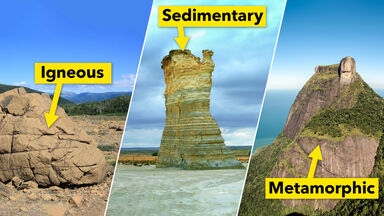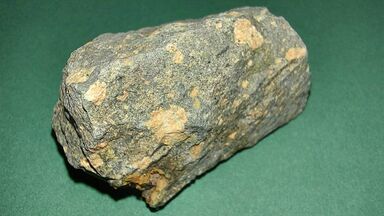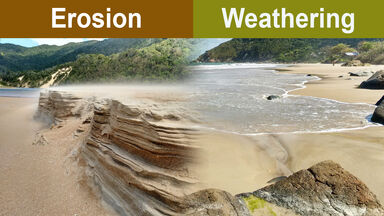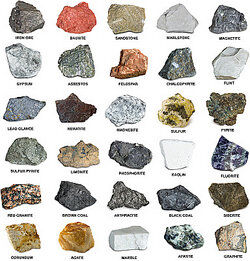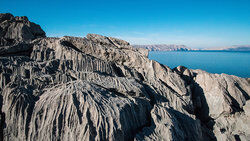Rock Definition
A topographic surname for someone living near a rock or an oak (atter + oke).
(Canada, preceded by "the" or "The") Nickname of the island of Newfoundland in the Canadian province of Newfoundland and Labrador.
- Confronted with equally unpleasant alternatives and few or no opportunities to evade or circumvent them.
- In a state of difficulty, destruction, or ruin:
Their marriage is on the rocks.
- Without money; bankrupt:
Our accountant says the business is on the rocks.
- To disturb the balance or routine of a situation:
He has an easygoing managerial style and won't rock the boat unless absolutely necessary.
- in a predicament; specif., faced with equally unpleasant alternatives
- to experience orgasm; ejaculate
- to feel any great or satisfying pleasure or excitement
Idioms, Phrasal Verbs Related to Rock
Origin of Rock
-
From Middle English rocke, rokke (“rock formation"), from Old English *rocc (“rock"), as in Old English stānrocc (“high stone rock, peak, obelisk"), and also later from Anglo-Norman, Old Northern French roc, roce, roque (compare Modern French roche, from Old French), from Medieval Latin rocca (attested 767), from Vulgar Latin *rocca, of uncertain origin, sometimes said to be of Celtic (Gaulish) origin (compare Breton roch).
From Wiktionary
-
From Middle English rokken, from Old English roccian, from Proto-Germanic *rukkōnÄ… (compare obsolete Dutch (Holland) rokken, Middle High German rocken "˜to drag, jerk', Icelandic rukka "˜to yank'), from *rugnōnÄ…, from Proto-Indo-European *h₃ruk-néhâ‚‚-, from *h₃runk- (compare Latin runcāre (“to weed"), Latvian rÅ©Ä·Ä“t (“to toss, dig")).
From Wiktionary
From Middle English rok, rocke , rokke, perhaps from Middle Dutch rocke (whence Dutch rok), Middle Low German rocken, or Old Norse rokkr (whence Icelandic / Faroese rokkur, Danish rok, Swedish spinnrock (“spinning wheel")). Cognate with Old High German rocko (“distaff").
From Wiktionary
-
Shortened from rock and roll. Since the meaning of rock has adapted to mean a simpler, more modern, metal-like genre, rock and roll has generally been left referring to earlier forms such as that of the 1950s, notably more swing-oriented style.
From Wiktionary
Middle English from Old North French roque from Vulgar Latin rocca
From American Heritage Dictionary of the English Language, 5th Edition
Middle English rokken from Old English roccian
From American Heritage Dictionary of the English Language, 5th Edition
Find Similar Words
Find similar words to rock using the buttons below.
